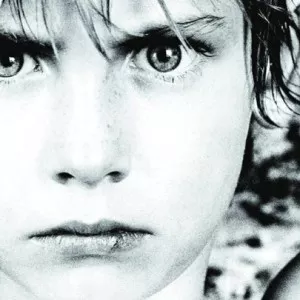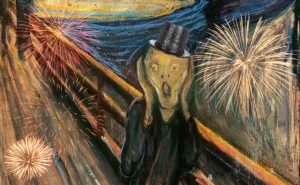The great farce played upon our thinking is the uninvestigated assumption that we exist. Or more specifically, that we believe ourselves to be a permanent, independent being. Despite evidence that life is unpredictable, we act as though this was not the case. We just assume we are as we think we are. And that assumption leads to the greatest folly of all – we believe we are in control. We believe we are the bozo driving the bus, despite our GPS being disconnected.
 I tend to live life from one project to the next, believing that -despite all prior experience- this time I will get it right. This diet, this financial plan, this meditation, this love. Especially this love. True Love. That’s the one that gets me. Each love I fall into becomes my center of being. I have always failed to see that my relationship to loving has all the hallmarks of classic addiction. In his masterwork, The Art of Loving, psychologist Erich Fromm defined “true love” as two people who were both ready for the same thing at the same time. He specifically nudged the reader away from the idea that we were part of something special. But, despite the slight-of-hand of hormonal urges, true love is not destiny. True love, like life itself, is a random occurrence that happened to succeed. Life is opportunistic. Einstein famously said, “God doesn’t play dice with the universe”. It seems, even a thinker as profoundly creative as Albert still searched for the occasional guarantee. If the universe doesn’t play dice it may be because dice only has 36 outcomes. The perplexing game of Go that has kept humans intrigued for 4,000 years, has less than 11,000 possible outcomes. If the universe is playing with us, It is using a much more vast and complex system than any game our brains can presently conjure. And, yet, within that ocean of possibility, we find that apple trees always breed apple trees. This interesting paradox is central to our existential being. Life is random and there are repetitive patterns throughout.
I tend to live life from one project to the next, believing that -despite all prior experience- this time I will get it right. This diet, this financial plan, this meditation, this love. Especially this love. True Love. That’s the one that gets me. Each love I fall into becomes my center of being. I have always failed to see that my relationship to loving has all the hallmarks of classic addiction. In his masterwork, The Art of Loving, psychologist Erich Fromm defined “true love” as two people who were both ready for the same thing at the same time. He specifically nudged the reader away from the idea that we were part of something special. But, despite the slight-of-hand of hormonal urges, true love is not destiny. True love, like life itself, is a random occurrence that happened to succeed. Life is opportunistic. Einstein famously said, “God doesn’t play dice with the universe”. It seems, even a thinker as profoundly creative as Albert still searched for the occasional guarantee. If the universe doesn’t play dice it may be because dice only has 36 outcomes. The perplexing game of Go that has kept humans intrigued for 4,000 years, has less than 11,000 possible outcomes. If the universe is playing with us, It is using a much more vast and complex system than any game our brains can presently conjure. And, yet, within that ocean of possibility, we find that apple trees always breed apple trees. This interesting paradox is central to our existential being. Life is random and there are repetitive patterns throughout.
So perhaps there is a pattern to the chaos? So far in our development, humans have always bred humans. But the configuration of any human psychology is a mix of recognizable patterns and random occurrence. In general, we will cling to familiar patterns and ignore possibility. In fact, strangely, we will cling to painful patterns rather than look to an undiscovered alternative. Or even, a newer pattern that brings relief from the pain. It has been said that the mind needs 90 days to fully change a pattern. And this, all the while knowing we must change. We could be killing ourselves and yet our survival instinct, as powerful as it is, is hijacked by some nefarious conditioned need. When we are enthralled in the euphoria of addiction, crawling down the mole hole in fear, or habitually trying to milk pleasure from stones, we are blinded to the alternatives. We mistake the moment for the fantasy, as we compulsively perform the same experiment again and again. And we know what Albert said about that.
Perhaps, God is playing a shell game. Despite astronomical odds of being, once life occurs, it believes itself to be the center of all things. In our small part of the universe, once conceived, we created an uberbeing fashioned after ourselves – replete with similar attributes, gender and political affiliations. Then we knew we were at the center of the universe and that everything was going according to plan. Ironically, feeling we were the center of all things, separated us from each other and the universe altogether. You see, when we believe we are the center of the universe, our life, or our family, then everything around us is only a projection. We see what we believe, which is to say, we see nothing but ourselves. And on some basic level this is very lonely. On some basic level, below all the games we play to keep us occupied, we are naked, cold and lonely. Because of this, we cling to all the tangible things that we feel provide us surety. And as we can reach out and touch these things, we feel to be in control, and so we never look beyond ourselves. We never see that if we were the center of anything it was the “vicious wheel of quivering meat conception” as Kerouac called samsara. We believe that the next thing we grasp will be the real thing and, although we’ve reached for that very thing time and time again, next time we’ll get there.
But, it’s our choice isn’t it? I mean it’s my life, I can run in circles if I like.
Trungpa Rinpoche called this the “myth of freedom.” Spinning on the wheel of samsara can be exhilarating. It can keep us so occupied we never have to see how naked, alone or frightened we really are. But, what happens when the wheel stops? One of the most frightening things, existentially speaking, is space. But just as “Steamboat Willie” is comforting to us, they are an imaginary narrative based on quickly flickering frames. Moving pictures move so quickly we believe it’s actually happening. Movies create the illusion of life by flickering 23 still-images a second, too fast for our eyes to see the s p a c e between each frame. But that space provides a glimpse into the possibility beyond. And that space is a crack in the belief systems we establish to prove we exist. In this way, our anxiety drives us relentlessly forward. Flickering images create the illusion that we are steering the ship.
In the same way, we believe we must steer the ship, lest we fall in and drown. But we may be holding the wheel so tightly, we never see that the ocean we’re steering across is an endless sea of undefinable change.


 When emotions run high, the fear mind takes over and latches onto simple answers. And naturally, we believe we are right. This feeling of righteousness wants retribution and dismisses the inclusion of societal and familial issues as pandering snowflakery. The Buddha spoke of Karma as the law of cause and effect. He also spoke of the interdependence of every event to all else. Despite conditioned tendencies toward black and white binaries, the Buddha saw that the causes of any event are myriad and nuanced. This would seem frustrating to the raging defensive mind latching onto rightandwrong. But a reactive mind is generally devoid of nuance or compassion. Compassion doesn’t mean kindness to those who’ve caused harm. It means understanding those who cause harm.
When emotions run high, the fear mind takes over and latches onto simple answers. And naturally, we believe we are right. This feeling of righteousness wants retribution and dismisses the inclusion of societal and familial issues as pandering snowflakery. The Buddha spoke of Karma as the law of cause and effect. He also spoke of the interdependence of every event to all else. Despite conditioned tendencies toward black and white binaries, the Buddha saw that the causes of any event are myriad and nuanced. This would seem frustrating to the raging defensive mind latching onto rightandwrong. But a reactive mind is generally devoid of nuance or compassion. Compassion doesn’t mean kindness to those who’ve caused harm. It means understanding those who cause harm. One of the ways we rob ourselves, and reduce our life is by demanding ownership of our experience. And ownership implies controlling the process and the outcome of what we own. But our life is not property. Life is a self-existing dynamic with our past and our world, unfolding naturally as a flower grows and unfolds. Ideally. But, as it is our life, we want what we want to occur in ways we want them to occur. And we want this in our time-frame. Like standing over a flower and yelling at it to grow faster. Or, maybe we are shaming, intimidating or manipulating the flower. Or maybe, more generously, we try coaching the flower to be its best self.
One of the ways we rob ourselves, and reduce our life is by demanding ownership of our experience. And ownership implies controlling the process and the outcome of what we own. But our life is not property. Life is a self-existing dynamic with our past and our world, unfolding naturally as a flower grows and unfolds. Ideally. But, as it is our life, we want what we want to occur in ways we want them to occur. And we want this in our time-frame. Like standing over a flower and yelling at it to grow faster. Or, maybe we are shaming, intimidating or manipulating the flower. Or maybe, more generously, we try coaching the flower to be its best self. A worldly path to perfection is quantifiable in comparison to our world. As vicious as it may be, it is comforting to judge our progress with standard quantifiable metrics. Are we becoming richer, thinner, or more popular? Do our peers turn their heads in admiration, or avert their glances in disdain? Whenever we have the wherewithal to stop and look, are we able to see our world? Or do we only see how far up the ladder we are?
A worldly path to perfection is quantifiable in comparison to our world. As vicious as it may be, it is comforting to judge our progress with standard quantifiable metrics. Are we becoming richer, thinner, or more popular? Do our peers turn their heads in admiration, or avert their glances in disdain? Whenever we have the wherewithal to stop and look, are we able to see our world? Or do we only see how far up the ladder we are?